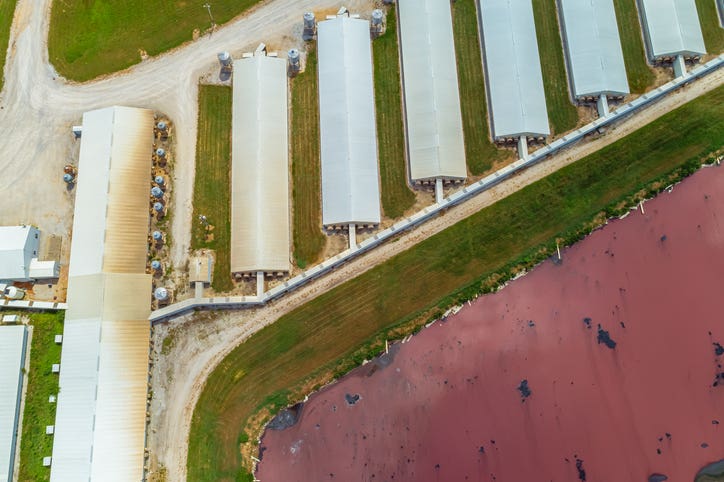
In Sweeping New Report, More Than 200 Climate Scientists Urge Consumers, Governments to Move Toward Plant-Based Diets
Doom-and-gloom climate change scenarios tend to dominate news headlines, but a new report out of Harvard suggests it’s not too late to reach our collective climate goals and avoid global warming catastrophe. Success, however, hinges on one critical caveat: We must act quickly to change the way we produce and consume food, by moving away from animal agriculture and toward plant-centered diets.
Findings from the report, co-authored by a team of academics and published by Harvard Law School’s Brooks McCormick Jr. Animal Law & Policy Program, are based on a survey of 210 climate scientists, researchers, and food system specialists from 48 countries. They agree that to meet Paris Agreement targets—including rolling back greenhouse gas (GHG) emissions to pre-2019 levels by 2030—an accelerated shift away from animal agriculture and toward low-carbon, plant-based alternatives is imperative, and must be approached on a global scale.
“This transition is crucial, as livestock production contributes significantly to greenhouse gas emissions,” says William J. Ripple, Ph.D., professor of ecology at Oregon State University and one of the report’s four co-authors. “Since this is a crisis, it only makes sense that any major shift involves all parties in high-income and middle-income countries including individuals, governmental policymakers, and corporations.”
Animal Agriculture and Climate Change
The livestock industry is implicated as a primary contributor to climate change in areas that include feed-crop production, the development of grazing land for cattle—the world’s leading cause of deforestation—and methane emissions produced by the animals themselves. Government agricultural subsidies that favor animal products are partly to blame, making an overhaul of global food-subsidy policies integral to reducing GHG emissions from animal agriculture, according to the report.
Given the volume of animal products consumed in high-income countries including the United States, the potential to drastically cut GHG emissions is vast, if decisive actions are implemented quickly. The report also identifies restructuring targets that include providing technology and resources to low- and middle-income countries, and facilitating transitions from livestock farming into the plant-based sector.
“We need to change the incentives of the producers and the prices that consumers face,” says report co-author Paul Behrens, Ph.D., a professor at Leiden University in the Netherlands specializing in food, climate, and energy systems. “Perhaps even more importantly, it will require a shift in the way big agribusiness operates in the food system, away from the more damaging animal-based foods towards more plant-based foods.”
Plant-Based Diets and Planetary Health
The report suggests that plant-sourced foods, because of their lower carbon footprint, should be prioritized in institutional food purchasing policies, particularly if they lead to better health outcomes than animal-sourced foods. Adopting this “Best Available Food” (BAF) approach—a system for identifying the healthiest foods with the lowest environmental impact—is also cited as a tool that can assist consumers in transitioning away from animal-based diets.
Growing fruits, vegetables, and grains for human consumption—instead of growing crops for animal feed—also makes sense from a global economic perspective, considering 67% of all food calories produced in the U.S. are earmarked as feed for animals. Phasing out feed crops, which comprise 43% of the world's farmland, has the potential to feed twice as many people worldwide, compared with current livestock farming systems, and would shore up food security infrastructure.
One vital component that can’t be underestimated, says co-author Behrens, is the role of the individual consumer in the success of reaching our collective climate change mitigation objectives. “Consumers are a big part of this transition,” says Behrens. “From research, we know that meat-eaters will eat more plant-based meals if those options are available to them. It should be a story of exploration of new foods, not of abstinence.”
The report is not the first time that climate experts have urged consumers toward more plant-forward diets. In an editorial published last month in the journal Nature Food, an international team of researchers called on the United Nations to recognize the environmental imperative for a global transition away from animal-based foods. In 2019, more than 11,000 scientists signed a paper calling for the reduction of animal products as a critical step that governments and individuals can take to mitigate the worst effects of climate change.
In addition to generating fewer greenhouse gas emissions, plant-based foods require significantly less land and put less strain on the water system than animal-based foods.
To learn more about a whole-food, plant-based diet, visit our Plant-Based Primer. For meal-planning support, check out Forks Meal Planner, FOK’s easy weekly meal-planning tool to keep you on a healthy plant-based path.

About the Author

About the Author
Aurelia d’Andrea
Join our mailing list
Get free recipes and the latest info on living a happy, healthy plant-based lifestyle.
By providing your email address, you consent to receive newsletter emails from Forks Over Knives. We value your privacy and will keep your email address safe. You may unsubscribe from our emails at any time.